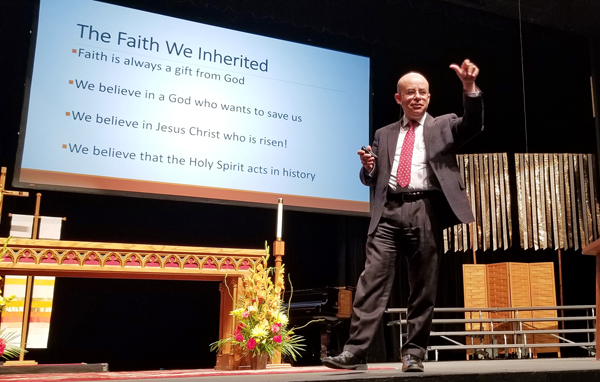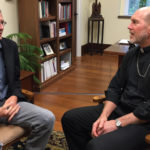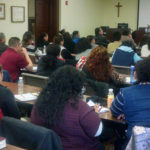
Hosffman Ospino speaks on “The Joy of the Gospel and the Vocation to Evangelizing Discipleship in a Time of Change” during the Vision 20/20 Convocation general session June 8.
By Anne Marie Amacher
The Catholic Messenger
“We are at a turning point in the Catholic Church in America. We are amidst challenges. But there is hope — Christian hope,” said Hosffman Ospino. An associate professor of theology and religious education at Boston College’s School of Theology and Ministry, he gave the final general session talk June 8 at the diocesan Vision 20/20 Convocation.
He reminded the audience that today’s Catholics are not the first or the last Catholics on earth. Christians have evangelized for centuries.
Acknowledging Our Gifts
Ospino noted that just like the early disciples complained, so do today’s Catholics. “But it’s not all gloom,” he said. “Faith is a gift from God. He wants to save us. Faith has been gifted to us because God loves us… We have inherited the church. The church is everyone. This is where it begins.”
His message focused on helping his audience to understand that the church is here and now and that they have an integral role in its future. Every time someone starts a new church program or discerns a vocation, for example, “you are writing church history.”
The church cannot return to the supposed “good old days” of centuries past. The church has had struggles throughout its history. Catholics need to move forward. “Bishop Zinkula invites you to help decide what the vision will be. Not for 1950, 1970 or 1980. But looking toward 2020, 2025, 2035.”
Read the signs of the times
Ospino encouraged the delegates to read the signs of the times — the here and now — with the eyes of faith. “Bishop Zinkula invites you to return to your parishes and talk about your community. Use your tools to evaluate your parish’s needs.”
The church is in a time of major cultural paradigm shifts, Ospino said. Secularism is on the rise and a crisis of institutional credibility exists.
Ospino reminded those in attendance that Christianity was not conceived with the U.S. culture in mind. It emerged in community. Today’s society does not reflect that sense of community. “We are losing our young people. In the past you were born into a Catholic community.
Today people choose to be Catholic.” In 1995, 3 percent of the U.S. population self-identified as nonreligious. By 2017, nonreligious affiliation rose to 25 percent. “This is a major challenge.”
The church’s (clergy sexual abuse) has been painful, Ospino said, and has resulted in a loss of credibility. Other institutions have also lost credibility, including schools, banks and other church denominations. To regain credibility, the Catholic Church needs to build up the family. “This is where it begins.”
He reminded the audience that Catholicism is an immigrant religion. Hispanics brought Catholicism to the U.S. “We’ve been here for 500 years.” In 1960, 90 percent of Catholics in the U.S. were Euro-American. Today, 47 percent are Euro-American. By 2050, an estimated 25 percent will be. The average age of Caucasians is 55, Hispanics, 29, and Asians, 32. The fastest growing population in the Catholic Church in the U.S. is Asian-Americans. Parishes should examine their existing demographics and consider the future. “You might not have many immigrants now, but will you be prepared for a transformation?”
Sharing the Joy of the Gospel in mission
Catholics need to recognize today’s realities and challenges, and prepare to evangelize first by engaging in prayer and Scripture. “The Gospel is still relevant.” When humans lose a sense of God, they lose a sense of what it is to be human. “The world needs to hear about God.” By baptism, Catholics are called to evangelize. “New generations are thirsty for religious meaning.”
But understand where they are at, Ospino advised. When he spoke with colleagues at Boston College who teach theology to undergraduates, he learned three things college students are obsessed with: Eastern traditions (yoga, Zen, Buddhism), zombies and vampires. They long for the spiritual, he said.
That’s what the church has to offer. He shared this advice for evangelization:
• Take the initiative. Don’t wait for your bishop or pastor; God comes to us.
• Get involved. Become interested in people’s stories.
• Accompany. It takes more than 10 minutes to become Christian. It can take a year, two years or 20 years. Conversion takes time.
• Yield fruits. Be witnesses to the faith. The Holy Spirit takes care of each one’s gifts.
• Celebrate the sacraments and liturgy.
As he concluded, Ospino offered the profile of a joyful disciple.
• Live here and now.
• Be aware of your baptismal condition.
• Be involved with Jesus Christ.
• Convince everyone they can encounter Christ.
• Be open to witness faith and joy.
“God calls you to embrace and be his visionary disciple.”











